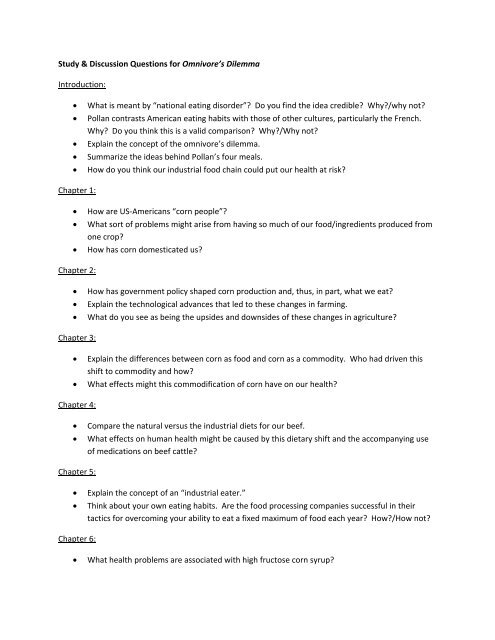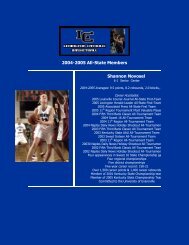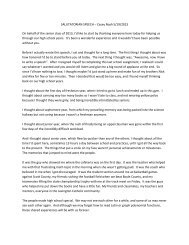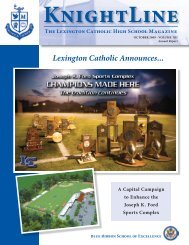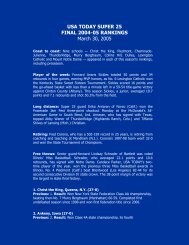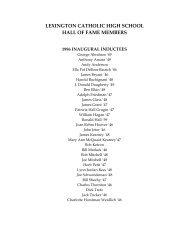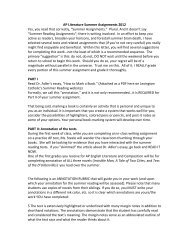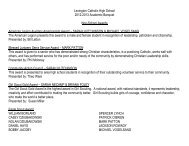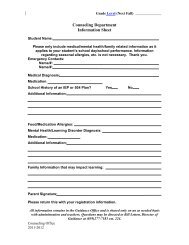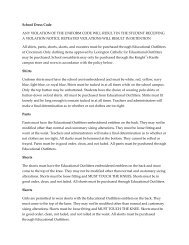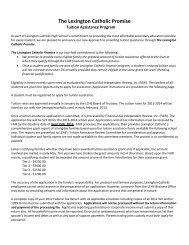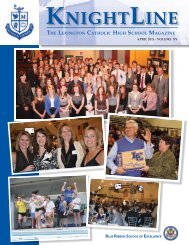Study & Discussion Questions for Omnivore's Dilemma - Lexington ...
Study & Discussion Questions for Omnivore's Dilemma - Lexington ...
Study & Discussion Questions for Omnivore's Dilemma - Lexington ...
- No tags were found...
Create successful ePaper yourself
Turn your PDF publications into a flip-book with our unique Google optimized e-Paper software.
<strong>Study</strong> & <strong>Discussion</strong> <strong>Questions</strong> <strong>for</strong> Omnivore’s <strong>Dilemma</strong><br />
Introduction:<br />
<br />
<br />
<br />
<br />
<br />
What is meant by “national eating disorder” Do you find the idea credible Why/why not<br />
Pollan contrasts American eating habits with those of other cultures, particularly the French.<br />
Why Do you think this is a valid comparison Why/Why not<br />
Explain the concept of the omnivore’s dilemma.<br />
Summarize the ideas behind Pollan’s four meals.<br />
How do you think our industrial food chain could put our health at risk<br />
Chapter 1:<br />
<br />
<br />
<br />
How are US‐Americans “corn people”<br />
What sort of problems might arise from having so much of our food/ingredients produced from<br />
one crop<br />
How has corn domesticated us<br />
Chapter 2:<br />
<br />
<br />
<br />
How has government policy shaped corn production and, thus, in part, what we eat<br />
Explain the technological advances that led to these changes in farming.<br />
What do you see as being the upsides and downsides of these changes in agriculture<br />
Chapter 3:<br />
<br />
<br />
Explain the differences between corn as food and corn as a commodity. Who had driven this<br />
shift to commodity and how<br />
What effects might this commodification of corn have on our health<br />
Chapter 4:<br />
<br />
<br />
Compare the natural versus the industrial diets <strong>for</strong> our beef.<br />
What effects on human health might be caused by this dietary shift and the accompanying use<br />
of medications on beef cattle<br />
Chapter 5:<br />
<br />
<br />
Explain the concept of an “industrial eater.”<br />
Think about your own eating habits. Are the food processing companies successful in their<br />
tactics <strong>for</strong> overcoming your ability to eat a fixed maximum of food each year How/How not<br />
Chapter 6:<br />
<br />
What health problems are associated with high fructose corn syrup
How have this and other highly processes ingredients come to be such a central part of the<br />
American diet<br />
Chapter 7:<br />
<br />
<br />
What are the plusses and minuses of such a corn‐intensive diet Taken into consideration our<br />
health, the environment, the economy, and even energy independence. Who wins Who<br />
loses How<br />
Toward the end of this chapter (pg. 117), Pollan asks, “Why should it matter that we have<br />
become a race of corn eaters such as the world has never seen Is this necessarily a bad thing”<br />
How would Pollan likely answer these questions You<br />
Chapter 8:<br />
<br />
<br />
Explain the concept of “grass farming” – how is this a different understanding of agriculture<br />
Explain the concept of “industrial organic”<br />
Chapter 9:<br />
<br />
<br />
<br />
Explain and give examples of “grocery lit.” Does such “literature” affect the way you think about<br />
food and your buying decisions Why/why not<br />
Compare and contrast the industrial food chain from the first section of the book with the<br />
industrial organic described in this chapter. How different are they<br />
What are the health and environmental (since environment is also connected to health) impacts<br />
of industrial organic Is it worth the extra cost and ef<strong>for</strong>t to eat organic Why/Why not<br />
Chapter 10:<br />
<br />
<br />
Revisit your earlier (Ch. 8) definition of grass farming. With this more in‐depth discussion, how<br />
would you now define it<br />
Summarize the steps and things that must be taken into consideration <strong>for</strong> successful grass<br />
farming.<br />
Chapter 11:<br />
<br />
<br />
As we saw on George Naylor’s corn farm in Iowa, most American farms no longer grow a wide<br />
variety of crops, but Joel Salatin’s approach to animal farming shows a deeply interconnected<br />
system. Explain the different aspects of the system and how each part contributes to the larger<br />
whole.<br />
What sort of health benefits might this different approach to animal husbandry (including the<br />
grass farming from Ch. 10) have on our health<br />
Chapter 12:
What does Pollan tell us here about our food safety regulations Do you think the regulations &<br />
regulatory system make sense Why/Why not<br />
How safe do you think our food supply is Why<br />
What changes do you think might be beneficial in the food safety regulatory system<br />
Chapter 13:<br />
<br />
<br />
<br />
What does Pollan suggest about the cost of industrial food versus Salatin’s food<br />
What do our food choices say about our priorities as a society<br />
Does the idea that you may over the long term spend less on healthcare if you were to spend<br />
more on naturally produced foods seem credible to you Why/Why not<br />
Chapter 14:<br />
<br />
How does Pollan think his meal produced by Joel Salatin’s farm might be nutritionally different<br />
from a similar meal grown on a regular, industrial farm Do you agree Why/Why not<br />
Chapter 15:<br />
<br />
<br />
Do you agree with Pollan that the hunter‐gatherer food chain is no longer sufficient <strong>for</strong> us<br />
What would be the costs or benefits to trying to restore more of that food chain Could that<br />
ef<strong>for</strong>t be viable Why/Why not<br />
Chapter 16:<br />
<br />
<br />
<br />
<br />
What are the good and bad points to the omnivore’s dilemma in Pollan’s view<br />
What are the influences of culture on what we eat How might this affect our heath<br />
Pollan focuses quite narrowly on the United States in terms of the difficulties of food choices<br />
and the issues with our food production methods. Do you think the American diet is that<br />
different from that of other countries Why/Why not<br />
According to www.aboutmcdonalds.com, McDonald’s is found in 118 countries – what does that<br />
say about our globalized food chain versus narrow American eating habits<br />
Chapter 17:<br />
<br />
<br />
Summarize the various ethical questions discussed with regard to eating meat.<br />
What are your own views on the ethical question of animal suffering and your (potential) meat<br />
consumption<br />
Chapter 18:<br />
<br />
<br />
<br />
What different emotions does Pollan experience while hunting<br />
If you have hunted, have you experienced similar feelings Explain.<br />
Do you think hunting your own food would give (or gives) you a different perspective as you<br />
eat Why/Why not
Chapter 19:<br />
<br />
What does mushroom <strong>for</strong>aging suggest about the omnivore’s dilemma<br />
Chapter 20:<br />
<br />
<br />
<br />
<br />
Pollan indicates that the meal he has produced is at the far opposite end of the human food<br />
chain from his first meal at McDonald’s and that “the pleasures of one are based on nearly<br />
perfect knowledge; the pleasures of the other on an equally perfect ignorance.” (pg. 410). Do<br />
you agree with Pollan Why/Why not<br />
Why does Pollan say that both his first and last meals are “equally unsustainable” (pg. 411) Do<br />
you agree Why/Why not Do you think the industrial organic or locally grown are<br />
significantly more sustainable Why/Why not<br />
Has reading this book changed the way you think about food or what you choose to eat<br />
Why/How/Why not<br />
What connections do you see between what you eat and your health How has the book<br />
affected your thinking in that regard


